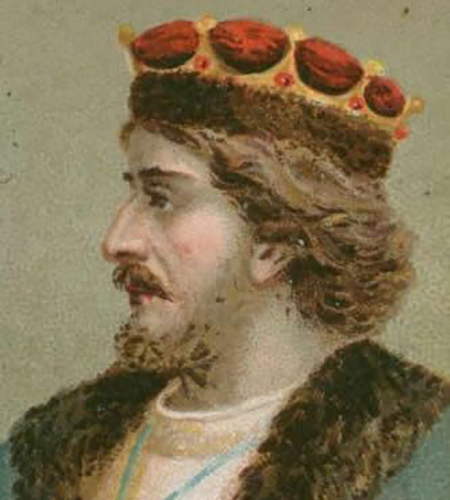



King Edgar the Peaceful – Quick Stats




Born: c. 943 AD
King Edgar the Peaceful: A Pillar of Early English Unity
King Edgar the Peaceful (c. 943 – 8 July 975) was a pivotal figure in early English history, renowned for his ability to unify the kingdom during a time of political and social transformation. His reign marked a period of relative peace and stability, earning him the moniker "the Peaceful." Despite his relatively short reign, his policies and reforms laid the foundation for a more unified England and influenced future monarchs for generations. This article delves into the life, reign, and legacy of King Edgar the Peaceful, examining his contributions to governance, religion, and national unity.
Early Life and Family
Edgar was born around 943 AD, the younger son of King Edmund I and Queen Ælfgifu of Shaftesbury. Following his father's untimely death in 946, Edgar's elder brother, Eadwig, ascended to the throne. Edgar spent his early years under the tutelage of prominent church figures, which greatly influenced his religious policies later in life.
Edgar was born around 943 AD, the younger son of King Edmund I and Queen Ælfgifu of Shaftesbury. Following his father's untimely death in 946, Edgar's elder brother, Eadwig, ascended to the throne. Edgar spent his early years under the tutelage of prominent church figures, which greatly influenced his religious policies later in life.
Upon Eadwig's death in 959, Edgar was proclaimed king of England. His coronation was delayed until 973, allowing time to consolidate power and ensure the loyalty of the nobility and clergy.
Reign of King Edgar the Peaceful
Edgar's reign, from 959 to 975, was characterized by peace, religious reform, and administrative consolidation. Unlike many of his predecessors, Edgar faced no major rebellions or foreign invasions during his time on the throne. His ability to maintain stability and foster unity across the kingdom earned him widespread respect.
Edgar's reign, from 959 to 975, was characterized by peace, religious reform, and administrative consolidation. Unlike many of his predecessors, Edgar faced no major rebellions or foreign invasions during his time on the throne. His ability to maintain stability and foster unity across the kingdom earned him widespread respect.
Consolidation of Power
One of Edgar's most significant achievements was the unification of England's various regions under a centralized government. He reinforced the authority of the monarchy and established stronger ties with regional leaders, ensuring loyalty through a combination of diplomacy and political acumen.
One of Edgar's most significant achievements was the unification of England's various regions under a centralized government. He reinforced the authority of the monarchy and established stronger ties with regional leaders, ensuring loyalty through a combination of diplomacy and political acumen.
Edgar's rule extended across England, including Northumbria and Mercia, regions that had previously been volatile and resistant to central authority. His efforts to bring these regions under control helped create a more cohesive and unified kingdom.
The coronation ceremony, organized by Saint Dunstan, became the basis for future English coronations. Elements of Edgar's coronation rites can still be seen in modern British coronations, including the anointing of the monarch.
Edgar's Domestic Policies
Edgar's reign saw several important administrative and legal reforms aimed at improving governance and promoting social order. Some of his notable policies include:
Edgar's reign saw several important administrative and legal reforms aimed at improving governance and promoting social order. Some of his notable policies include:
Standardization of Coinage: Edgar introduced a standardized system of coinage across England, facilitating trade and commerce. This reform helped to stabilize the economy and reduce regional disparities.
Law Codes: One of the defining aspects of Edgar's reign was his issuance of law codes aimed at strengthening justice and maintaining social order. These laws reflected Edgar's desire for fairness and the protection of vulnerable members of society.
Promotion of Trade: Edgar encouraged trade and commerce by maintaining peace and ensuring the safety of trade routes. His reign saw increased prosperity and economic growth, benefiting both the nobility and commoners.
Legacy of King Edgar
King Edgar's reign is often seen as a golden age of peace and prosperity in early medieval England. His policies and reforms laid the groundwork for a more unified and stable kingdom, influencing subsequent monarchs such as his son, Æthelred the Unready, and his grandson, Edmund Ironside.
King Edgar's reign is often seen as a golden age of peace and prosperity in early medieval England. His policies and reforms laid the groundwork for a more unified and stable kingdom, influencing subsequent monarchs such as his son, Æthelred the Unready, and his grandson, Edmund Ironside.
Religious Legacy
Edgar's support for the Benedictine Reform movement had a lasting impact on the English church. The revitalization of monastic life and the standardization of liturgical practices strengthened the church's role in society and ensured its continued influence in English politics.
Edgar's support for the Benedictine Reform movement had a lasting impact on the English church. The revitalization of monastic life and the standardization of liturgical practices strengthened the church's role in society and ensured its continued influence in English politics.
Political Legacy
Edgar's ability to maintain peace and stability during his reign earned him a reputation as a wise and capable ruler. His coronation ceremony at Bath became a model for future monarchs, emphasizing the importance of unity and loyalty.
Edgar's ability to maintain peace and stability during his reign earned him a reputation as a wise and capable ruler. His coronation ceremony at Bath became a model for future monarchs, emphasizing the importance of unity and loyalty.
Religious Reforms
Edgar was a devout Christian and a staunch supporter of the Benedictine Reform movement, which aimed to revitalize monastic life in England. He worked closely with influential church figures such as Saint Dunstan, Bishop Æthelwold of Winchester, and Oswald of Worcester to implement religious reforms.
Edgar was a devout Christian and a staunch supporter of the Benedictine Reform movement, which aimed to revitalize monastic life in England. He worked closely with influential church figures such as Saint Dunstan, Bishop Æthelwold of Winchester, and Oswald of Worcester to implement religious reforms.
These reforms focused on:
Restoring monasteries that had fallen into disrepair or lax practices.
Promoting monastic rules based on the Benedictine tradition, emphasizing discipline, prayer, and scholarly pursuits.
Standardizing liturgical practices across England, fostering a sense of religious unity.
Restoring monasteries that had fallen into disrepair or lax practices.
Promoting monastic rules based on the Benedictine tradition, emphasizing discipline, prayer, and scholarly pursuits.
Standardizing liturgical practices across England, fostering a sense of religious unity.
Edgar's support for the church earned him the loyalty of the clergy, which was crucial for maintaining political stability. The king's association with the church also helped legitimize his rule and promote his image as a pious and just monarch.
Coronation at Bath (973)
Edgar's coronation in 973 was a significant event in English history, symbolizing his authority and the unity of the kingdom. Held at Bath, the ceremony included a unique ritual in which Edgar was rowed down the River Dee by eight subordinate kings, signifying their allegiance to him.
Edgar's coronation in 973 was a significant event in English history, symbolizing his authority and the unity of the kingdom. Held at Bath, the ceremony included a unique ritual in which Edgar was rowed down the River Dee by eight subordinate kings, signifying their allegiance to him.

Edgar's reign also marked a turning point in the development of the English monarchy. By consolidating power and promoting central authority, he helped create a more cohesive and unified kingdom, setting the stage for future rulers to build upon his achievements.
Cultural Legacy
Edgar's reign saw a flourishing of culture and learning, particularly within monasteries. The promotion of monastic scholarship led to the preservation and production of important literary and historical works, contributing to the cultural heritage of medieval England.
Edgar's reign saw a flourishing of culture and learning, particularly within monasteries. The promotion of monastic scholarship led to the preservation and production of important literary and historical works, contributing to the cultural heritage of medieval England.
Conclusion
King Edgar the Peaceful was a transformative figure in early English history. His reign marked a period of peace, stability, and religious reform that had a lasting impact on the kingdom. Through his policies and leadership, Edgar helped to unify England and strengthen the monarchy, leaving a legacy that influenced future generations. His coronation ceremony, administrative reforms, and support for the church remain significant milestones in the history of medieval England, cementing his reputation as one of the most important rulers of his time.
King Edgar the Peaceful was a transformative figure in early English history. His reign marked a period of peace, stability, and religious reform that had a lasting impact on the kingdom. Through his policies and leadership, Edgar helped to unify England and strengthen the monarchy, leaving a legacy that influenced future generations. His coronation ceremony, administrative reforms, and support for the church remain significant milestones in the history of medieval England, cementing his reputation as one of the most important rulers of his time.
Key provisions of Edgar's law codes included:
These law codes contributed to the stability and prosperity of Edgar's reign, creating a more just and orderly society. They also demonstrated his commitment to both secular governance and religious principles, reinforcing his reputation as a wise and capable ruler.
Support for Vulnerable Groups: Edgar's laws protected vulnerable members of society, including widows, orphans, and slaves. His laws prohibited the mistreatment of slaves and encouraged their humane treatment.
Penalties for Crimes: Edgar's laws established clear penalties for various crimes, including theft, assault, and property disputes, with an emphasis on restitution and compensation to victims.
Regulation of Weights and Measures: To promote fair trade, Edgar's laws regulated weights and measures used in commerce, preventing fraud and exploitation.
Standardization of Legal Practices: Edgar sought to create uniform legal standards across the kingdom, ensuring that justice was applied consistently regardless of regional differences.
Protection of Monastic Land and Property: Edgar's laws safeguarded the lands and rights of monasteries, reflecting his strong support for the church and monastic reform.
Successor: Edward the Martyr (son
Predecessor: King Eadwig (brother)
Æthelred the Unready (with Ælfthryth)
Saint Edith of Wilton (with Wulfthryth)
Edward the Martyr (with Æthelflæd)
Children:
Ælfthryth (third wife)
Wulfthryth of Wilton (second wife)
Æthelflæd Eneda (first wife)
Wives:
Father: King Edmund I
Mother: Ælfgifu of Shaftesbury
Died: 8 July 975 AD


